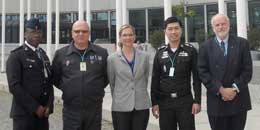Law Enforcement Statement of Support for Harm Reduction launched at UNCCPCJ

Photo L-R: Chief Superintendent Jones Blantari (Ghana), Police Colonel Aleksandr Zelitchenko (Rtd) (Kyrgyz Republic), Senior Constable Melissa Jardine (Rtd) (Australia), Police Lt. Colonel Krisanaphong Poothakool (Royal Thai Police) and Superintendent Frank Hansen (Rtd) (Australia).
Over 4,000 police signatures in favour of harm reduction approaches were presented at the United Nations Commission on Crime Prevention and Criminal Justice on the 23rd of April 2013 in Vienna. Five serving and retired police from the International Police Advisory Group (IPAG) presented to an audience comprising representatives from Member States, UNODC, NGOs and a number of police officers and called for police to be seen as part of the solution in HIV prevention, not just part of the problem.
The IPAG is an advisory body to the Law Enforcement and HIV Network which serves to connect police and harm reduction organisations to improve access to HIV prevention services for vulnerable groups, such as injecting drug users and sex workers. The Chair of IPAG, retired Superintendent Frank Hansen from Australia, opened the event saying “Drug use will always be part of society. Police must accept that and use a harm reduction approach to ensure the best interests of the entire community are addressed”.
Superintendent Hansen said that the IPAG had collected more than 4,000 police signatures from over 30 countries. He added that police were well placed to see the negative impacts of policing and that momentum was gathering among police to support harm reduction approaches. Chief Superintendent Jones Blantari, Ghana Police, said police should be seen as partners in HIV prevention. In Ghana, even though sex work is illegal, police have not prosecuted anyone for this crime for over three years as a result of an official police instruction to not enforce laws against sex workers. Supt. Blantari said this highlighted that changes in police practices can occur in difficult policy environments.
Retired Police Colonel Aleksandr Zelitchenko spoke with pride about receiving a medal to recognize his efforts in HIV prevention in the Kyrgyz Republic. His work involved advising police to use their investigation skills to ‘chase the big sharks who deal drugs and not the small fish who are addicted to drugs’. The support of senior Kyrgyz Republic officials was essential in making progress in harm reduction, especially among Republican Police and the Prisons Systems Veteran Associations. Col. Zelitchenko also praised the Moldovan Police Academy after 100 police instructors signed the Statement of Support, paving the way for greater integration of harm reduction in the academy’s curriculum.
Whilst harm reduction has been part of the police curriculum in the Kyrgyz Republic for some time, Police Lt. Colonel Krisanaphong Poothakool from the Royal Thai Police Cadet Academy said integrating harm reduction in police training in Thailand remained a challenge. Lt. Col. Poothakool said greater investment must be made to work with police and the community to reduce stigma associated with drug use which hinders support for programs servicing drug users. He went on to say that politicians in Thailand were risk averse in making policy decisions without widespread public support.
The International Police Advisory Group is the first international coalition of police formed around supporting harm reduction. Australia’s former Senior Constable Melissa Jardine said the key to convincing other police to support harm reduction was through a peer-to-peer advocacy model which capitalised on the characteristics of trust and solidarity within police culture. She said, ‘Due to the nature of police work – that it is often dangerous and unpredictable – police develop strong bonds with colleagues, not only among their own police service, but with police across the globe’. There are currently 21 IPAG members from 13 countries. The IPAG is seeking police champions from all countries to promote harm reduction and contribute to its advisory role.

IPAG members agreeing to be part of the Advisory Group for the Eurasian Harm Reduction Network’s program to reduce police violence against female drug users and sex workers in Eastern Europe and Central Asia.
UNODC HIV and Law Enforcement specialist Zhannat Kosmukhamedova said that increasing police participation in harm reduction advocacy, planning and implementation was ‘very much on the agenda for UNODC’ and that she looked forward to collaborating with the IPAG and Law Enforcement and HIV Network in the future.
Police and law enforcement officers are encouraged to sign up to the statement using the links below so we can continue to show our support for harm reduction approaches.



